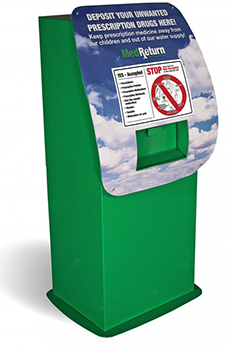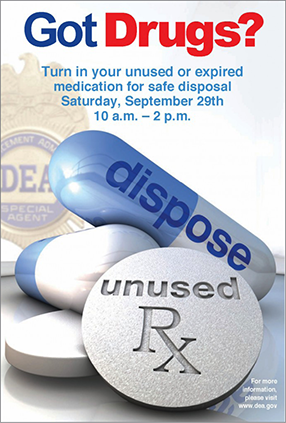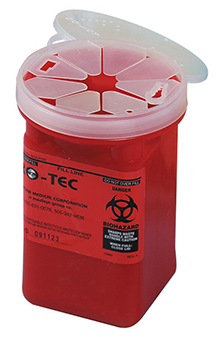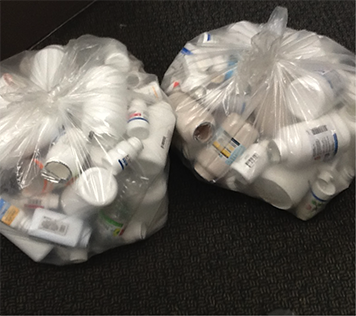15.8 Safe, Green Pharmacy
What to do with unused medications is also a matter of corporate and professional ethics as well as public safety. Safe disposal in the home, pharmacy, and institutional settings helps to control drug abuse and prevent environmental pollution. Proper recycling of the many plastic and glass drug stock bottles is also best practice for the environmentally sensitive pharmacy.
The issue of disposal is such an important one that the International Pharmaceutical Federation (FIP) has a publication dedicated to the topic. FIP has published the “Green Pharmacy Practice Report for Pharmacists,” which recommends increased awareness and education of both pharmacy personnel and consumers. For a view of the initial study report, go to https://PharmPractice7e.ParadigmEducation.com/FIP.
Take Back the Medications
Pharmacy personnel can educate consumers and help them dispose of their unused medications. Experts say that the first, best option for consumers handling unused or expired medications is to return them to the pharmacy where they were dispensed. Each pharmacy can establish its own safe medication return container. The National Community Pharmacists Association (NCPA) offers a Dispose My Meds program for over 1,600 participating independent pharmacy members. The object is to protect patients and the environment while potentially attracting new patients through this low-cost return program. Pharmacy containers to collect medications are available in either 10- or 20-gallon drop boxes, or pharmacies can give patients convenient postage pre-paid envelopes. Other methods for drug disposal can be found at https://PharmPractice7e.ParadigmEducation.com/Disposal.
 Work Wise
Work Wise
If your pharmacy does not have the capabilities to take back medications, you can help patients find a disposal site by directing them to the locator on AWARxE site: https://PharmPractice7e.ParadigmEducation.com/Disposal.

The DEA is helping communities sponsor drug take-back days and location sites.
If your pharmacy does not yet have such a program, the DEA sponsors a National Prescription Drug Take Back Day event in the spring or fall, and pharmacies can get involved. More information can be found at https://PharmPractice7e.ParadigmEducation.com/TakeBack.
In some communities, local fire departments, hospitals, university pharmacy departments, and/or waste management facilities assist in disposing of medications in an environmentally friendly and safe manner as well. Unused drugs and samples in sealed packaging that have not been tampered with can at times be donated to charity pharmacy clinics.
Home Drug Disposal
Proper disposal of expired or unused medications at home is also important to the safety of patients, children and young adults, and the environment. Therefore, pharmacy personnel need to discuss options for proper disposal of medications with their patients.
 Pharm Fact
Pharm Fact
By the beginning of 2016, the FDA had reported at least 26 cases of accidental exposure to fentanyl transdermal patches; most of the cases were of toddlers less than two years of age. Sadly, 10 children died and 12 required hospitalization.
Flushing medications down the toilet is no longer recommended due to adverse effects on the environment. Studies have demonstrated that pharmaceuticals are present in our nation’s waterways, and further research suggests that drug traces are appearing in our drinking water and also causing harm to aquatic species in our rivers, lakes, and oceans. These flushed medications include prescription drugs, samples, OTC drugs, and diet supplements. One option for the home disposal of medications is to mix them with some undesirable material like coffee grounds or kitty litter, then put them in a sealed plastic bag or can and place them in the trash. Scratch out the label’s prescription information, and recycle the container.
Patients also need to be counseled on the safe disposal of used transdermal patches that contain medications, especially for the narcotic fentanyl or nicotine (for smoking cessation therapies). Medication remains in the patches, causing serious adverse effects and even death in young children and pets if used or ingested. The patches must be kept out of their reach, so patients should not simply toss them in the trash. Patients can safely discard used patches by folding the sticky sides together and also placing them in coffee grounds or kitty litter, sealing them in a bag or unmarked container, and immediately putting them into a sealed, pet- and child-proof trash receptacle. As noted, flushing used patches down the toilet removes the patches but causes other problems. Unused nicotine patches (as well as nicotine gum and lozenges) are considered hazardous waste and must be discarded per state regulations.

Ask if the pharmacy participates in National Prescription Drug Take Back Day.
Community Pharmacy and Institutional Drug Disposal
Proper disposal of all expired or unused pharmacy inventory—medications and syringes—is an important corporate responsibility In the past, liquid drugs (even hazardous agents) were discarded in the sink, drain, or toilet. The Environmental Protection Agency (EPA) has studied the problems of pharmaceutical waste. As a result of those studies, new mandates were issued that declared all expired drugs—of any dosage form—to be hazardous waste. The EPA rules require all healthcare facilities (including hospitals, clinics, physician and dental offices, long-term care facilities, and community pharmacies) to implement an effective plan for the disposal of hazardous pharmaceutical waste, instead of using the drain or trash disposal. Returning expired or unused medications to the wholesaler is the preferred method. The new rules simplify requirements for shipping hazardous drug waste to disposal facilities.
 Pharm Fact
Pharm Fact
More than 100 different pharmaceuticals have been detected in lakes, rivers, streams, and reservoirs. The drinking water of 41 million Americans also has traces of medications that can affect their health.
 IN THE REAL WORLD
IN THE REAL WORLD
In Tulsa, Oklahoma, a network of over 20 retired physicians go on rotational visits to 68 long-term care facilities to pick up unused medications. They transport these to Tulsa County’s low-cost pharmacy clinic to be dispensed for free to those who cannot afford the medications they need. The program started in 2004. As of June 2019, over 241,260 prescriptions have been filled, with a value of over $24 million. Because the program is run with volunteer help, it has cost only $6,000 of administration time to accomplish this, putting these medications to good use for poor county residents and keeping the medications from the detrimental waste stream, saving safe disposal costs.
Medications Recovered for the Less Fortunate
It is estimated that between 10% and 30% of prescribed drugs are never used. In some areas, networks of retired physicians and pharmacists are collecting unused, unopened medications from nursing homes and other long-term care facilities to redistribute at low-cost or charity pharmacies. In these situations, the institutional facility must ensure that no tampering has happened to the medications unused by the patients. These programs are run in ways to ensure that controlled substance protocols and documentation rules are met.
 Pharm Fact
Pharm Fact
Over four billion prescriptions are filled in the United States every year, and it has been estimated that as much as a third of the dispensed medication goes unused—leading to potentially 200 million pounds of pharmaceuticals that can be abused or adversely affect the environment if disposed of improperly.
Sharps Disposal
As explained in earlier chapters, syringes, needles, and lancets are considered “sharps” and should not be discarded in common trash receptacles, whether at the pharmacy or at home. Since community pharmacies are more and more frequently administering vaccines, they are generating sharps waste. Hospitals and long-term care facilities abound in used sharps. Proper disposal of all sharps is critical not only to the safety of individuals, but also to the prevention of communicable diseases, such as hepatitis or HIV. It is mandatory that all of these items be thrown away in a sharps container. The sharps container should be placed in the pharmacy in a secure location away from children, and when nearly full (75%), it should be sealed, labeled, and mailed to a designated vendor according to pharmacy protocol.

All vaccine and insulin syringes and needles must be disposed of in a sharps container.
More than eight million patients every year are self-administering injections (such as insulin, allergy shots, vitamin B12, blood thinners, and hormones) while at home. Unfortunately, this increased patient use of sharps has resulted in an increase in improper waste disposal. According to the US Environmental Protection Agency, over three billion needles, syringes, and lancets are improperly disposed of each year.
A vast majority of these are from diabetic patients. All diabetic patients on insulin or checking their blood sugar at home should be encouraged by technicians and pharmacists to purchase a rigid, puncture-resistant, hard plastic sharps container from their community pharmacy to dispose of all sharps safely. Proper disposal of sharps protects everyone—family members as well as garbage disposal workers—from the risk of injury or infection that comes with contact with the trash. Sharps, including needles, lancets, and razor blades, can also be placed in the hard plastic containers that once held oral tablets for safe disposal in the trash.
For more information, “Community Options for Safe Needle Disposal” can be found at https://PharmPractice7e.ParadigmEducation.com/SharpsDisposal.
Waste and Recycling
During the day, a typical pharmacy as a business will accumulate a great deal of waste. Several times during the day a pharmacy technician may need to empty the trash baskets, seal the trash bags, and bring them to a trash bin for pickup or incineration. No syringes, needles, medications, or protected patient information should be discarded in the common trash receptacles. Responsible pharmacies participate in a store- and hospital-wide recycling program, making available appropriate receptacles for correct disposal of each different type of recyclable material, from plastics to paper. If your pharmacy is not yet doing so, a query or suggestion can be made about this.
Every pharmacy also accumulates hundreds of empty plastic drug stock bottles each day. Most are eligible for recycling. Many pharmacies allow patients to bring their empty medication bottles back for a refill of the exact same medication rather than starting a new one. So it is a good practice to ask patients if they brought their old container and would like it refilled.
Developing countries are in desperate need of medication containers! Many patients in places such as Malawi have to leave a rural clinic or hospital with their pills wrapped in torn pieces of paper. Patients in the United States can collect their containers, wash them in dishwater or with boiling water to clean them and remove the labels, and then send to collection groups for those in need. Some charity organizations in the United States accept them as well, such as free medical clinics and homeless shelters, veterinary clinics, and hospitals.
Also, it is a good idea to remind patients (in person or with posters or flyers) that, after being washed, medication containers can be useful around the house for storage of many small items, such as buttons, fishing hooks, or bobby pins.

Most empty drug stock bottles are eligible for recycling.